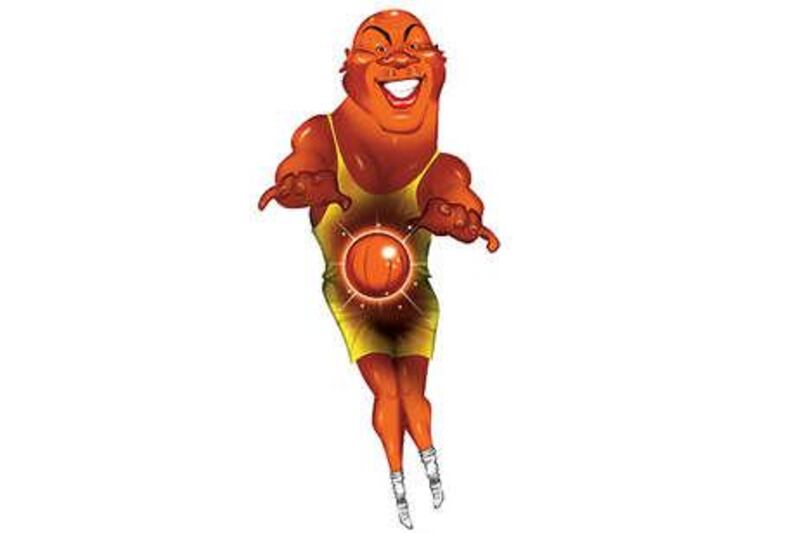Who do you think is sport's all-time best? Each week, we will profile a candidate, inviting you to decide who should top our list of 50. All participants will be entered into a draw for the weekly adidas prize and an end-of-contest Etihad Holidays four-day trip for two, including business class flights and accommodation, to a mystery location. We will reveal the full 50 at the end, but this week Paul Pabst looks at basketball's Magic Johnson.
When you talk about what puts an athlete among the greatest, I think it goes beyond what they do during a game. What former Los Angeles Lakers star Ervin "Magic" Johnson did on the basketball court was legendary, but his impact on college basketball, the National Basketball Association and American culture goes to another level. Starting on the court, when I first saw Magic playing for Michigan State University in 1977, it just appeared wrong. Six-foot nine-inch guys should not play point guard. Little guys ran the point.
Magic, however, was not a lumbering big man in any way. He was smooth and he was always in control on the court. He was the future of basketball. Magic dominated during his two season at Michigan State and led the Spartans to the NCAA title game against Indiana State and their star, Larry Bird, at the end of the 1978-1979 season. This game is arguably the most important in college basketball history.
The NCAA Tournament was not the monstrosity it is today. The matchup of the two young stars in the finals was made for television and is still the highest rated college basketball game in history. "The Magic-Bird NCAA finals established the NCAA Tournament as a television event," Seth Davis of Sports Illustrated said. "Soon after this game the tournament expanded, three times over the next seven years. The tournament became an American must-watch sporting event and you can credit Magic and Bird."
After college, Magic had a similar effect both on and off the court for the NBA. On the court, Magic did not miss a step when he joined the Los Angeles Lakers in 1979. During his career he won five championships, three NBA Finals Most Valuable Player awards and was a 12-time All-Star member. These awards, however, don't tell the story. Magic branded the Lakers as fast and exciting brand of basketball. Lakers games became the new hot spot for Hollywood celebrities. "Showtime" was the Lakers' nickname and Magic was the leading man.
Across the country was Magic's old nemesis, Larry Bird of the Boston Celtics. Bird was as big a star in Boston as Magic was in Los Angeles. The duo battled in the NBA Finals three times during the 1980's, the impact of these matchups cannot be overstated. This is pre-Michael Jordan NBA we are talking about. Before Jordan and the Nike shoes and the dominant Chicago Bulls teams, we had Magic and Bird making the NBA mainstream again.
When you look at the financial windfall Magic made for the NBA, his yearly salaries which hovered around $3 million per season seem like a bargain. Fast forward to Nov 7 1991: Magic Johnson calls a press conference to announce that has tested positive for HIV and that he would retire immediately. To put this in context, in 1991 I thought this was a death sentence for him. The public was not fully aware what having HIV or AIDS meant. The announcement was met with shock and disbelief. Fans did not want Magic to leave the league and he was voted to the 1991-1992 NBA All-Star Game despite not playing a game that season.
The decision to play again was met with mixed reaction by Magic's NBA comrades. Some players expressed fear of battling on court with someone who was HIV positive. As I said, this was a different time. We knew less about his disease. Magic was open with his battle and with the topic of fear. His struggle became a public discourse about dealing with those with HIV and Aids. Soon after the 1991-1992 season Magic was chosen to compete in the 1992 Summer Olympics for the United State basketball team. The "Dream Team" dominated in Barcelona and Magic added a gold medal to his resume.
With his playing career over, Magic has continued to be an activist for HIV/AIDS and has become a wildly successful businessman. He focused his businesses on the long-ignored urban areas. Again, Magic has used his touch to have a financial impact. If you keep the conversation to only what an athlete does on the court, you might go with Jordan or Kareem Abdul-Jabbar as the greatest. To me, Magic did more and we all benefitted.
ppabst@thenational.ae Cast your vote and enter a draw for a weekly Dh500 adidas voucher and a dream trip with Etihad Holidays. If you think Johnson is the all-time best, text G37 to 2337 Texts cost Dh5 and voting will end at midnight on Thursday January 1.





